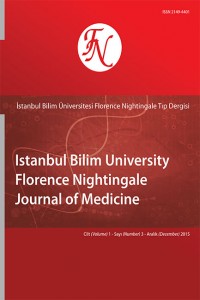Abstract
Objectives: Relevancy to regional anesthesia in pediatrics has increased, because it is complementary to general anesthesia, allows conscious postoperative analgesia without respiratory depression, technical difficulties have been defeated and new local anesthetics have been improved. Therefore we reported data of patients who underwent pediatric surgery and received regional anesthesia.
Patients and methods: We retrospectively analyzed data of all patients, who were operated in the pediatric surgery clinic of our hospital during the time period from 1.01.2012-31.12.2012 and therefore received regional anesthesia. Total amount of operations and regional anesthesia, demographic variables, regional anesthesia techniques, supportive sedatives and general anesthesia requirements, agents used for anesthesia, diagnoses and complications were recorded.
Results: In the year 2012 a total of 2,116 patients were operated in our pediatric surgery clinic and 1,196 patients (713 boys, 483 girls, mean age 5.9±4.3 years; range 2 days to 17 years) received regional anesthesia. Caudal block was implemented in 718 patients, epidural block in 218 patients, ultrasonography (USG)-guided transversus-abdominis-plane (TAP)-block in 189 patients, USG-guided ilioinguinal-iliohypogastric block in 52 patients and spinal block in 19 patients. Average age of patients receiving caudal, epidural, TAP, ilioinguinal-iliohypogastric and spinal block was as follows: 3.1±2.3, 5.4±3.1, 3.6±2.8, 4.4±2.6 and 6.5±7.9 years. Levobupivacaine 0.25% was used in 868 patients, bupivacaine 0.25% in 309 patients, heavy bupivacaine 0.5% in 19 patients. Sedation in spinal anesthesia was done with midazolam and/or propofol, the other blocks were supportive to general anesthesia. Laryngeal mask airway was inserted into 981 of the patients and 196 patients were orotracheally intubated. No other complication was observed than hematoma due to USG-guided ilioinguinal-iliohypogastric block in one patient.
Conclusion: The importance of preventing postoperative pain should be considered in pediatrics and therefore advantage of regional anesthesia techniques should be taken. As far as differences in anatomy, physiology, pharmacology are well known, regional anesthesia is safe to apply in pediatrics.
Keywords
Abstract
Amaç: Rejyonel tekniklerin genel anesteziyi tamamlayıcı bir yöntem olarak düşünülmesi, bilinci ve solunumu etkilemeden ameliyat sonrası analjezi sağlaması, teknik güçlüklerin aşılması, yeni lokal anesteziklerin gelişimi pediatrik hastalarda rejyonel anesteziye ilgiyi artırmıştır. Bu nedenle pediatrik cerrahi geçiren ve rejyonel anestezi uygulanan hastalarımızın verilerini sunduk.Hastalar ve yöntemler: 1.01.2012-31.12.2012 tarihleri arasında hastanemiz çocuk cerrahisi kliniğinde ameliyat edilen ve rejyonel anestezi uygulanan tüm hastaların verileri geriye dönük incelendi. Toplam ameliyat ve rejyonel anestezi sayısı, demografik verileri, rejyonel anestezi teknikleri, destekleyici sedatif ve genel anestezi gereksinimleri, anestezi için kullanılan ajanları, tanıları ve komplikasyonları kaydedildi.Bulgular: 2012 yılında çocuk cerrahisi kliniğinde 2116 hasta ameliyat edildi, 1196 hastaya (713 erkek, 483 kız, ort yaş 5.9±4.3 yıl; dağılım 2 gün- 17 yıl) rejyonel anestezi uygulandı. 718 hastaya kaudal blok, 218 hastaya epidural anestezi, 189 hastaya ultrasonografi (USG)-güdümlü transversusabdominis-düzlem (TAP) blok, 52 hastaya USG-güdümlü ilioinguinal-iliohipogastrik blok, 19 hastaya spinal anestezi uygulandı. Kaudal blok, epidural anestezi, TAP blok, ilioinguinal-iliohipogastrik blok ve spinal anestezi uygulanan hastaların yaş ortalaması sırasıyla 3.1±2.3, 5.4±3.1, 3.6±2.8, 4.4±2.6 ve 6.5±7.9 yıl idi. 868 hastada %0.25’lik levobupivakain, 309 hastada %0.25’lik bupivakain, 19 olguda %0.5’lik ağır bupivakain kullanıldı. Spinal anestezi uygulanan hastalarda midozolam veya propofol ile sedasyon uygulanmıştı diğer tüm hastalarda genel anestezi uygulanmıştı. 981 hastaya larengeal maske takıldı ve 196 hasta orotrakeal entübe edildi. Ultrasonografi-güdümlü ilioinguinal-iliohipogastrik blok yapılan bir hastada hematom gelişmesi dışında komplikasyonla karşılaşılmadı.Sonuç: Çocuk hastalarda da ameliyat sonrası ağrının engellenmesinin önemi unutulmamalı, bu amaçla rejyonel tekniklerden faydalanılmalıdır. Pediatrik olguların anatomik, fizyolojik, farmakolojik farklılıkları bilinerek güvenle rejyonel anestezi uygulanabilir.
Details
| Primary Language | English |
|---|---|
| Journal Section | Case Reports |
| Authors | |
| Publication Date | December 7, 2015 |
| Published in Issue | Year 2015 Volume: 1 Issue: 3 |

